Mozambique: Mondlane's party to hold Executive Committee meeting this Tuesday
“Decentralisation seems to be solved” in Mozambique
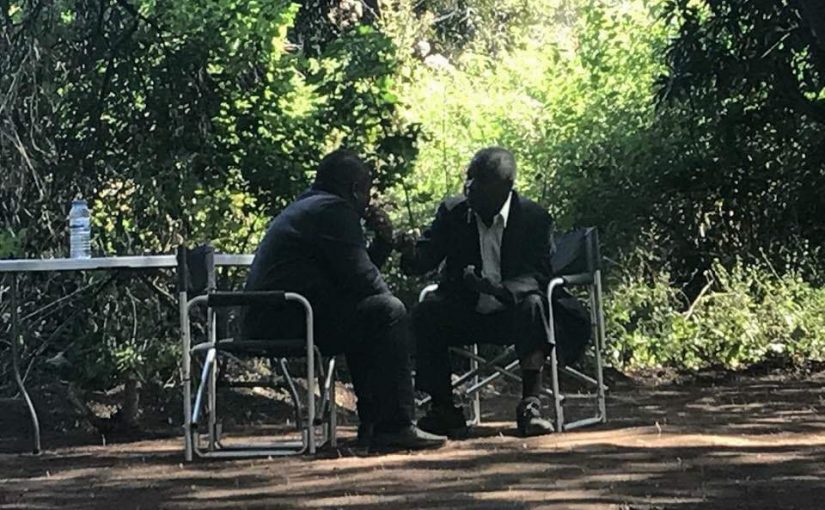
Twitter (@AllexandreMZ)
For investigator Joseph Hanlon, the integration of the opposition military into the army, “an issue still unsolved”, is more important than any agreement between Renamo and Frelimo on the election of provincial governors.
Mosambik Treffen Nyusi und Dhlakama in Gorongosa (Presidency of the Republic of Mozambique)
Meeting between Filipe Nyusi and Afonso Dhlakama in Gorongosa
Renamo leader Afonso Dhlakama has not been seen in public for a year and a half, but on Saturday (23.09) he appeared to announce an agreement with Frelimo for the direct election of the provincial governors, currently appointed by the government, which would represent an important step towards achieving peace in the country.
According to the opposition leader, the decentralisation project will next be approved by the Assembly of the Republic, where Frelimo has a majority.
Decentralisation of power should not be a major problem, Joseph Hanlon, a journalist and professor at the Open University of the United Kingdom, told DW Africa.
Integrating Renamo members into the army would however be a tactical option for Frelimo to reduce conflict in the country, and a strategically correct one at that.
The more officials of different orientations are elected, the more democratic the country will be, Hanlon points out. But Hanlon says he does not know what Dhlakama means when he says he “wants to be more democratic” regarding the election of provincial governors.
“There are already elections for the national parliament, provincial assemblies, for the president, for mayors, but he [Afonso Dhlakama] has not made any other decentralisation demands besides insisting on the elections for governors,” he explained.
Also Read: Dhlakama announces agreement with President to elect provincial governors in Mozambique
Decentralisation: “problem solved”

“Decentralisation seems to be already solved, but an unsolved issue, I think, it concerns the military integration of Renamo into the national military army,” Hanlon says. “President Nyusi made a speech to the military telling them that they must accept greater changes. This implies that the government is prepared to accept some integration of Renamo’s military.”
According to Hanlon, Dhlakama has emphasised that he wants to see “enough” positions for his members within the Armed Forces. The goal is to ensure his safety. “Two years ago there were at least two military attacks on him,” Hanlon said.
What is certain is that the only enemy that the government has today is Renamo, says the journalist. “If it integrates Renamo in the army, there is no more enemy,” Hanlon explains.
Also Read: President Nyusi awarded Military Leadership Gold Medal – Watch
Also Read: Nyusi urges Armed Forces to “adapt to historic moments”
But the interest of the parties seems to go beyond the peace accords. It also concerns the access to money that the two parties can gain by accessing power. “The main interest is peace, but peace bought by giving Renamo members strategic positions within the army, giving them money,” he said.
“It was always like this, like in 1994. Peace had to be bought in. Renamo’s participation in the elections was bought. The agreement of Renamo in the war was bought. The United Nations has this clear. They buy the opposition, and so it will be again.”
General Peace Agreement

In 1992, the Government and Renamo signed the General Peace Agreement. A second agreement was signed in 2014 to end military hostilities. Even so, Mozambique experiences regular outbreaks of violence, and the opposition refuses to accept the election results alleging electoral fraud.
But opposition members are also part of the electoral machinery, says Hanlon. “Renamo has had all its requests answered during the election. It was part of the process, nothing happened without their members being present. Who can say of their own people that they will not be corrupt or have acted improperly?”
On the other hand, following statements by opposition leader Dhlakama about the agreement with Frelimo for the election of provincial governors from 2019, António Niquice, secretary for the mobilisation of Frelimo, said: “We want to welcome these efforts and also highlight the role that the leadership of Renamo and other living forces in society have been launching in support of Filipe Nyusi’s initiatives.”
The smaller parties were apparently beyond the scope of the agreement announced by Dhlakama. Joseph Hanlon cites the Democratic Movement of Mozambique (MDM), which “should continue as a small party,” even after the direct election of provincial governors is approved.



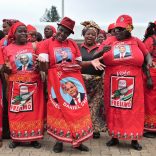
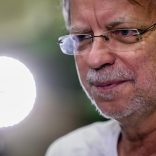

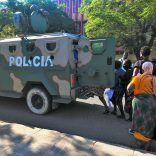
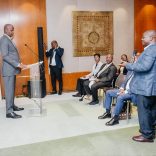




Leave a Reply
Be the First to Comment!
You must be logged in to post a comment.
You must be logged in to post a comment.